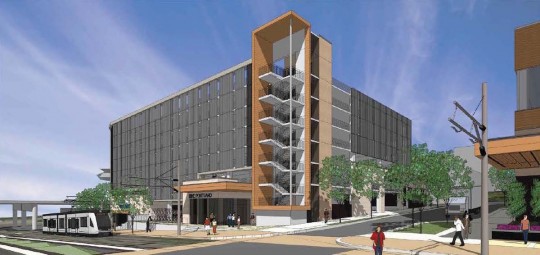
The viaduct on the left is Interstate 5.
(Renderings via NextPortland)
The city’s economic development agency agreed this month to have city taxpayers make an eight-figure bet that driving to the Rose Quarter area is going to remain popular for decades.
The Portland Development Commission voted Feb. 10 to borrow $26 million from one of its property tax funds to build a new 425-stall parking garage on public land between NE Holladay Street, Multnomah Street, 1st Avenue and 2nd Avenue, across the street from the Rose Quarter Transit Center.
Fifty of those stalls would then be resold to TriMet for an estimated $8 million, and the other 375 would be set aside for rental to the publicly subsidized 600-room Hyatt Regency Convention Center Hotel that’s supposed to go up across the street.
The PDC made headlines last fall for arguing that it couldn’t afford to dedicate half of urban renewal tax revenue to affordable housing because it had too many other important priorities.
The PDC says it will turn a profit with this project, and an independent local parking consultant says in this case that’s likely.
But the big public loan making it possible is coming at a time when more than half the private-sector hotels in Portland’s central city aren’t building any new parking at all.
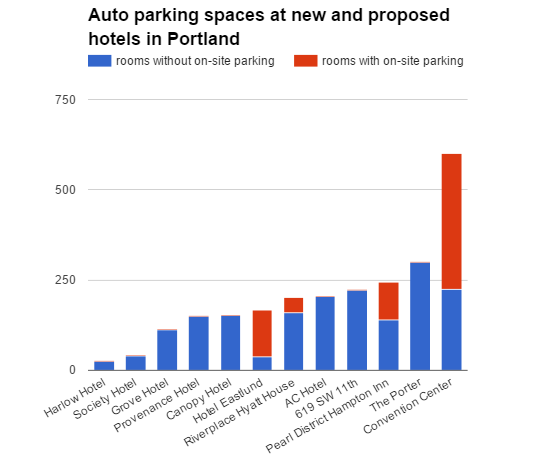
To be sure, all of these hotels will be catering to overnight guests and others who bring cars. But most of the privately funded hotels are choosing to rent spaces from nearby off-site parking garages rather than taking out long-term loans to finance new garages.
If the PDC’s revenue projections for the garage turn out to be wrong, Lloyd District taxpayers will be on the hook. Any losses would come out of urban renewal funds that might otherwise be used for local street improvements — for example, planters along the protected bike lane on NE Multnomah, or reconstruction of NE Broadway for better walking, biking or transit.
By the same token, if the garage turns out to make money, the PDC would have more money to spare for such street improvements and other projects.
Garage revenue analysis is secret and came from firm with millions at stake in hotel project
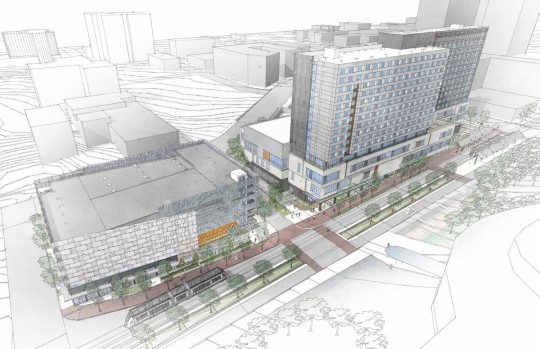
City officials say they’re confident the garage will be profitable. In fact, they say it’ll deliver $500,000 in profit, after operations and construction debt payments, out of about $2 million in annual revenue.
“If you were going to own a garage in town, this’d be the garage you’d want to own.”
— Bruce Wood, senior city project manager
“If you were going to own a garage in town, this’d be the garage you’d want to own,” said Bruce Wood, the PDC project manager working on the garage deal.
Wood said the PDC can’t share the formula that was used to estimate the garage’s revenues, because it’s proprietary.
“They won’t even send it to me,” Wood said.
In this case, “they” includes Schlesinger Companies, a Portland parking management and development firm. Wood said the company estimated that the garage will be able to get 90 percent of its revenue from a projected valet charge of $35 per car per night, which Wood said is on the low side in the Portland hotel market.
“All the models and everything were provided to us by the experts in the parking industry,” Wood said. “In this particular case, the Schlesingers were one source.”
The Schlesingers are also the people who own the land beneath the would-be hotel. They have been vocal advocates for the various public subsidies that have been lined up to support its construction.
“It’s very important to our family to get this deal done,” Barry Schlesinger told Willamette Week in 2013 for an article that described his family’s company as “troubled.”
Wood, the city project manager, said he is “not an expert on managing parking demand” and that he has never calculated what the projected revenue per stall would be in the garage; he only knows the total revenue projections from each anticipated use. But based on the garage’s projected annual debt service of $1.3 million, plus $1,000 annual operation and maintenance cost per stall, the hotel portion of the garage would need to net an average of $12 per stall per day to break even, or $18 per day to deliver the $500,000 annual profit the PDC projects.
Though the formula Schlesinger Companies used to calculate demand for the garage is proprietary, PDC spokesman Shawn Uhlman said, the PDC is happy to share its outputs.
Independent parking consultant says garage will likely make money, but isn’t sure why public must fund it
Rick Williams, a Portland-based parking consultant who ran the district’s Go Lloyd business association for 20 years and does business with many of these players but has not been involved in the deal, said the PDC’s assumptions of profitability are reasonable.
Mostly, that’s because hotel parking is very lucrative.
“On the very top of the pyramid, for parking issues, is hotel parking,” Williams said.
Another reason the garage is likely to be a good investment, Williams said: hotel parking garages clear out during the day, so some spaces in the Hyatt lot could potentially be rented out to Lloyd District office workers, or to people attending daytime events at the Oregon Convention Center immediately to the south.
Advertisement
Concerts and games at the Moda Center might also help fill stalls.
“I think it’s got a good shot to be viable, because it has the capacity to stack those revenue sources,” Williams said.
But if a parking garage in this area is such a good idea, why isn’t someone in the private sector — such as the Schlesinger family, or the Mortenson Development company that’s helping develop the Hyatt — taking out a loan and pocketing the projected 25 percent profit itself?
“That’s a very good question,” Williams said. “I don’t know why the hotel doesn’t build it, because I wasn’t privy to that conversation.”
If city succeeds in reducing driving, garage deal could backfire
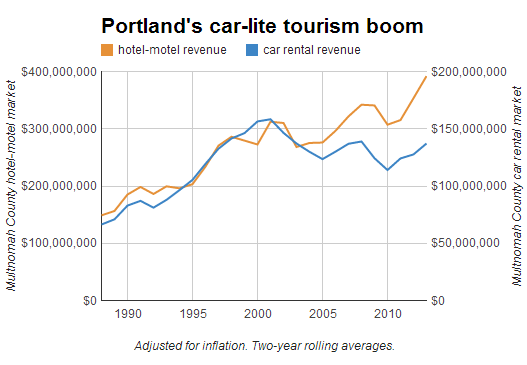
Critics of the deal say it makes no sense for the public to be helping finance a long-term future where a central-city hotel has a car parking stall for 62 percent of its rooms.
After all, by 2030 — 12 years into the lifespan of a garage, when it’ll still be trying to pay off its construction loans — the city is aiming for only 30 percent of trips in the entire city to happen by car.
Another variable in the mix: self-driving cars. International business consulting group McKinsey and Company predicted last month that by 2030, 15 percent of new cars sold could be autonomous and 10 percent could be shared, with much higher rates in major cities. If that were to happen, demand for central-city parking could fall dramatically.
“Do we believe that a 600 room hotel in one of the most transit rich areas in one of the most transit/bike/walk-able cities in the nation, built adjacent to a light rail line that goes directly to the airport and downtown, in a district with over 3,000 structured spaces, will be parked to capacity in 2030?” asked Tony Jordan of the paid-parking advocacy group PDX Shoupistas in a blog post last week. “Doubtful. This is a dinosaur plan.”
Indeed, auto use among Portland tourists has already been falling much faster than auto use among Portland residents. As we reported in 2014, hotel and motel sales are up 26 percent since 2001, after inflation, but car rentals are down 13 percent.
“If we have a national convention, we have mostly out-of-town visitors who don’t have cars here. They either walk or they take the MAX.”
— Scott Cruickshank, executive director, Oregon Convention Center
The argument for publicly subsidizing a large private hotel is that it will lure out-of-town conventions to Portland, bringing cash into the region’s economy. But Scott Cruickshank, executive director of the Oregon Convention Center, said last week that almost no one who comes to Portland for an out-of-town convention is looking to park a car.
“If we have a national convention, we have mostly out-of-town visitors who don’t have cars here,” Cruickshank said. “They either walk or they take the MAX. They don’t typically rent cars and drive to the center.”
Cruickshank, like Williams, said he thinks the hotel needs its own parking garage — but not for the sort of national conventions that the hotel is theoretically being built to attract. Both said the planned garage will be useful for attracting local and regional conventions to which most people drive cars.
Wood said he approached Cruickshank to ask if the 800-space garage at the south end of the Convention Center site could meet the hotel developer’s request for 375 guaranteed spaces at all hours. Cruickshank said no.
Not building parking garage would probably kill hotel deal, PDC warns
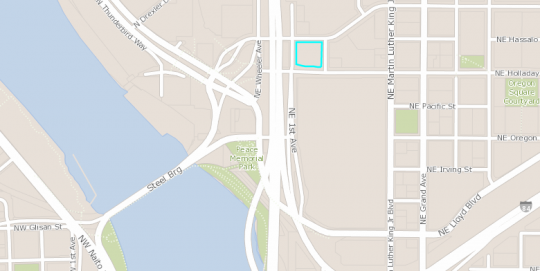
(Image: Portlandmaps.com)
The Portland Development Commission’s Feb. 10 vote to finance the garage out of its urban renewal funds, previously reported by the Portland Business Journal and NextPortland, does not need to be approved by the Portland City Council, according to Uhlman. That means public funding for the project is a done deal.
(PDC commissioners are appointed by city council. Mayor Charlie Hales, a backer of the hotel, is the commissioner in charge of the PDC. When the city council voted on the hotel plan, only Commissioner Steve Novick opposed it.)
Both the garage and hotel are currently in land use review with the city’s Bureau of Development Services.
According to the PDC’s staff report on the measure, any decision not to finance and approve the parking garage would probably tank the hotel deal.
“If the Parking Garage does not move forward, it is unlikely that the Hotel would move forward,” the report says. “Without the Parking Garage, the Hotel would require a substantial redesign and additional financial resources to fund the required below-grade parking.”
Williams, the parking consultant, said he thinks 375 parking spaces for a 600-room hotel is relatively modest and in line with demand at other hotels. As for the possibility that autonomous car technology might cut the garage’s revenue, he said that’s possible but too vague to base a business plan on.
“It’s a wave that people think is coming, but it’s a wave that has no data,” Williams said. “Let’s just build as little parking as we need.”
— Michael Andersen, (503) 333-7824 – michael@bikeportland.org
We need your help. Please become a subscriber today so we can continue to bring stories like this to life.
The Real Estate Beat is a regular column. You can sign up to get an email of Real Estate Beat posts (and nothing else) here, or read past installments here.




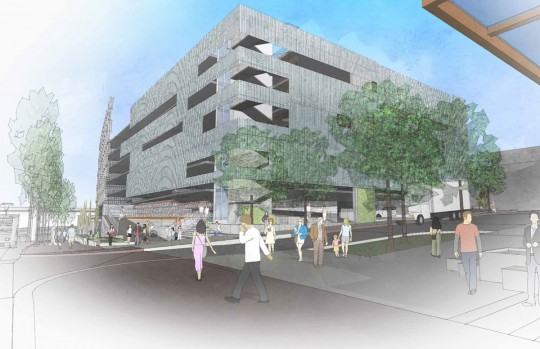
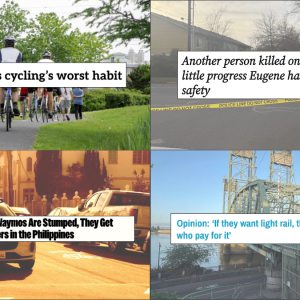
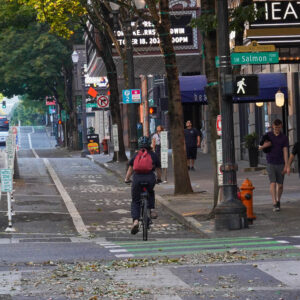

Thanks for reading.
BikePortland has served this community with independent community journalism since 2005. We rely on subscriptions from readers like you to survive. Your financial support is vital in keeping this valuable resource alive and well.
Please subscribe today to strengthen and expand our work.
Portland history shows that whenever a project is not bound to make the developer richer, the PDC ensures that taxpayers foot the bill. I’d like to know how many on the PDC are even Portland taxpayers. Like Metro, the PDC does nothing but waste Portlanders’ money on projects we don’t approve of. Put it to a public vote, PDC, and see how far you get. I’d love to see both suburban-mentality organizations gone.
I agree. The PDC had a time and place. I believe that time is over. Disband it.
Thanks Michael! This issue sorely needs more coverage.
I’m not a true parking professional, but I can’t imagine a scenario where this pencils out in 2025 let alone 2035.
Even if cars aren’t driving all over town in 2025 (which they probably WILL be) they almost certainly will be parking themselves. There are 3300 spaces in the area, 2000 are publicly owned already, when cars park themselves, utilization per sq/foot will go up and there will be even more spaces.
Let’s remember that when this plan was cooked up, Lyft and Uber didn’t even exist.
That’s the thing about PDC, nothing they do needs to pencil out because it’s not their money, it’s someone else’s (ours).
Completely backwards priorities. This is 1960’s thinking, not 2016. Do we really think people will be driving from the airport to this hotel, which is currently a $2.25 one seat ride on the Red Line? What about in 20 years? Parking garages are notoriously difficult to adaptively reuse for anything else but car storage.
Instead of wasting money on free housing for cars, the PDC should instead be funding affordable housing for people – something that we actually need. At the very least, spend this money on free TriMet day passes for hotel-goers.
Parking in this garage definitely won’t be free.
Cars aren’t going away. Even if they were, let’s pretend everyone will ride their bikes to the convention center and the rose quarter in 20 years: they could use a parking garage to park them all.
That said, it is the last thing in the world that should be publicly funded.
Forget in 20 years, They could ride MAX there today. This garage makes no sense now nor does it make sense for the future.
Sorry, I missed your transmission, can you resend the telegram? Or wait, my landline phone was knocked off the hook, can you call again? Sorry, my cable was out, I missed the show at 8:30, I’ll have to wait for it to be on re-runs.
The “cars aren’t going away” argument is as tired as “not everyone can ride a bike” a small shift 10-20% is MASSIVE. There are already 3300 structured spaces in the ares, 2000 of them are city owned.
This is a bad idea if it is privately funded, it flies in the face of our city and regional transportation plans. As a publicly funded garage, it should be criminal.
The only reason that “car’s won’t go away” is because we keep designing our cities around their unfettered use. Design your city for people instead of cars and they will mostly go away.
Yes it is, and it will be great, and we’ll get there, but the other 80% or so will still be cars. Not necessarily cars powered by gas or driven by people or carrying only one occupant, but cars.
If you want to be an advocate for parking reform (or bicycles for that matter), you’ll be more successful if you’re pragmatic and realistic. If you ignore the world around you like Adam, instead of assessing the current state of your environment logically and the steps needed to effect lasting change, you’re going to come across as tone deaf and be taken less seriously by the rest of the people you share a city with.
“Assessing the current state of your environment logically and the steps needed to effect lasting change” is exactly what the Dutch did in the 70’s and look where that got them. In the US, we are not doing this, but instead operating under the assumptions and beliefs of the past.
Excpet that Americans and the Dutch are not the same. Our histories are different, our economoes are different, oir geographies are different.
Good forbthe Dutch that they figured something out. Portland is not Holland.
I’m writing this from Leiden, and about 500m away, they are building a new parking garage at the edge of the city center. This page (http://www.lammermarktleiden.nl/het-project/het-ontwerp/) is in Dutch, but I think the pictures provide a good idea of what is going on.
There are cars here, and parking garages.
our central city is carpeted with parking garages. in the 70s many dutch city centers were too. imo, you should be thankful that the netherlands adopted the kinds of policies that tony and adam are arguing for.
Apparently a bunch of the Portland city center parking will be going away before too long…
greg: That’s not really true. Int he next decade or so we might see a couple hundred spaces removed as the lots redevelop. Many of those spaces are currently occupied by food carts. Several of the buildings taking their place will probably have parking. Furthermore, the city is relaxing regulations that allow for more shared uses of parking downtown, so the current supply should be able to be used more efficiently than it is now.
And even apart from the issue of city center parking, it strikes me that this location is pretty much exactly where one would -want- to have parking. At the junction of two freeways (and other major auto access routes), surrounded by the convention center, Moda center, and all the new Lloyd district development, as well as being just outside the city center, so that people can park there an need not drive into the center. That’s more or less the way we do parking here.
Greg: again… there are already 3300 structured spaces right there. Spaces that will be less and less utilized as people use lyft/uber/car2go/max/bikes and autonomous vehicles. There’s plenty of parking in the area… adding 10% more capacity isn’t going to solve any short term problems (if there are any) and it’s not going to be needed in 5-10 years.
In the absence of idealists and dreamers, the needle doesn’t move much. I think we need them, always “needling” the pragmatists.
The advice to, essentially, moderate one’s idealistic tone always sounds to me like a semi-polite “shut up”. The push-pull of idealists and dreamers vs down to earth pragmatists keeps things dynamic, and dynamism is what we desperately need if we’re going to make change.
Very good points. I think it’s possible to be passionate about something and still have realistic expectations.
There is an art to negotiating: Ask for more than you want but not so much that you spoil the deal from the start. Then, meet somewhere in the middle.
The untempered idealism I take issue with is the kind that ignores these laws of compromise and dismisses the needs of others. If you say to PBOT: ‘we want this street to be car free!’ and PBOT says ‘no, the other 80% of our constituents feel differently, how about we lower the speed limit and add bike lanes, that would make it safer for everyone,’ and you say ‘no we want this street to be car free!’ That doesn’t move the needle, that just makes you sound out of touch.
I’m not against idealism, just the tone deaf kind.
That example only makes sense if lowering the speed limit and adding bike lanes actually worked. It doesn’t. Our current tools don’t work and we need to find new ones. Asking vulnerable road users to compromise their safety for the convenience of people driving is unacceptable.
I’m being completely pragmatic. This garage won’t be built for 4-5 years. In the last 4-5 years we have seen Uber/Lyft and tremendous progress towards autonomous vehicles.
The current city projections/goals call for the reductions in car use I am citing to support my position that this garage is excess capacity and shouldn’t be built (especially with public money).
We don’t back up our goals because we kowtow to the angry folks who are clinging to their cars.
I have yet to see a single cogent argument that these spaces will be needed or used to capacity in 2025. It’s just not going to happen.
We don’t disagree at all about this particular garage, just that cars aren’t going away.
I don’t give a damn if they build these spaces. It’s the waste of an entire city block adjacent to a major transit center and the use of public funds that I find infuriating. Would it kill them to design two underground levels under the hotel? How about making it two stories taller and making the second and third floors parking? If it costs too much to redesign, then why the hell didn’t they design the hotel that way to start with?? Was it a desire to help out the struggling Schlesinger family by purchasing all their land instead of just 2/3 of it?!
Last year single occupancy vehicle mode share was 67%. Bringing that number down to 50% or even 40% is absolutely achievable. This is also the stated goal of this city in just about every major plan over the past decade.
You forgot the rest of that paragraph:
“Do we really think people will be driving from the airport to this hotel, which is currently a $2.25 one seat ride on the Red Line?”
Because the average businessman going to a convention will just love to cart all of his luggage onto the Max.
So because an “average” male businessperson won’t carry his suitcase onto a light rail vehicle, we the taxpayers should subsidize his driving habit with a $26 million cheque?
We need to be designing for the behaviours we want, not for the ones we have.
“So because an “average” male businessperson won’t carry his suitcase onto a light rail vehicle, we the taxpayers should subsidize his driving habit with a $26 million cheque?
We need to be designing for the behaviours we want, not for the ones we have.”
LOL. Most of the conventions hosted in Portland are regional ones.
So, you are telling a guy in Longview going to a convention in Portland that he is supposed to put his luggage in his car, drive to a Max park and ride in Portland close to Vancouver, leave his car at the park and ride for the duration of the convention (it’s illegal to park a car at a TriMet park and ride for more than 24 hours, BTW), lug his luggage onto Max, and take Max to the convention center hotel.
Is that the behavior we are expecting?
The convention center hotel is probably going to be a financial disaster anyway – you are really going to tell people driving into Portland from elsewhere in the Northwest that they’re not supposed to drive to the convention center hotel, but are supposed to park their car somewhere else and ride Max in?
The garage has just over one space per two hotel rooms – that doesn’t seem to be an unreasonable amount of parking.
On PUBLIC lands. With PUBLIC money.
“On PUBLIC lands. With PUBLIC money.”
Yeah, the convention center hotel is an incredibly stupid idea, but refusing to provide any parking for it is an even stupider idea.
that logic leads down a weird path if you extend it.
“that logic leads down a weird path if you extend it.”
The convention center hotel will be a financial disaster (as is the convention center itself).
Refusing to provide a moderate amount of parking for the hotel will make the hotel a bigger financial disaster. (People who book conventions pay attention to things like the amount of available parking.)
Oddly enough, the parking garage is likely to be the only profitable part of the whole enterprise.
If it’s going to be a financial disaster, and the project won’t happen because PDC won’t build the garage, then why is everyone determined to see it through? Please, flush my money down the toilet, I’m begging.
Most of the business women I know travel with a carry-one rollaboard and a small personal item. Perfect for quick travel via public transportation rather that the annoying long wait at the rental car counter when all you want to do is get where you’re going.
Yep. It’s easy to forget about Airport MAX if you never use it. But when you’re on it and see people with a suitcase or carryon, you realize the value.
Quick research shows over 3000 people/day on average, use MAX to/from the airport.
Each of these 425 parking spaces costs $2000 per year, amortized over 30 years (not including interest!). That’s over $5 per day per space. Crazy.
“Most of the business women I know travel with a carry-one rollaboard and a small personal item. Perfect for quick travel via public transportation”
If that were the case, you’d see lots of business people using Max to get from the airport to downtown already.
Is that the case?
Anecdotaly (nope, I don’t have the data but I’m sure someone does), when I traveled to Portland for business before I moved here AND when my colleagues and other business associates travel to Portland since I moved here three years ago, we ALL took the MAX from the airport to downtown. Not a single person rented a car or drove.
Have you traveled to a city on business via an airplane, Random? What was your travel style and those of your colleagues?
Same here. I know I will be taking public transport on both ends, so I fly with just a large backpack, so I don’t have to deal with the hassles of checking bags, picking up bags, and traveling around a city with multiple large suitcases. People can easily adapt to the environment they are presented with.
“People can easily adapt to the environment they are presented with.”
So long as you like the environment that people are presented with, of course.
If you don’t like the environment that people are presented with (like minor impediments to bicycle travel, for example), that immediately becomes completely unacceptable and it’s completely unreasonable to expect people to “easily adapt”.
Not everyone can manage travel with “just a large backpack”, but we don’t need to care about those who can’t.
In any case, as I’ve noted, most users of the convention center are going to be driving in to Portland, not flying in.
Citation needed.
And there’s no reason someone with a few bags can’t ride MAX. They are low-floor, it’s a shorter walk than to the closest parking garage or rental car.
“Citation needed.”
Portland, like other medium sized cities, has a real problem attracting sizable conventions – the kind that people will fly in from long distances to attend. The convention center hotel is supposed to fix that, but it won’t.
Ride the Max past the convention center, and see what meetings are occurring there – you might get a few people from flying in from Seattle, Spokane, and Boise for these things, but otherwise things are pretty local.
I belong to several of national professional and industry associations – they may meet in Seattle occasionally, but never Portland.
“Portland, like other medium sized cities, has a real problem attracting sizable conventions”
-This is the type of backward reasoning that businesses use to keep our society from making progressive changes (e.g. banks that are “too big to fail”)
If Portland is not currently able to attract those splendid “sizable” conventions, is one parking garage for one hotel going to be a paradigm shift?
The purpose of this hotel is to attract larger conventions
I wish my Mom would do that. A three day trip needs a large bag for clothes, a large bag for books and other items for entertainment, a medium shopping bag for knitting…
Then I have my backpack with clean socks, underwear, a pair of pants, and two extra tshirts.
Park and rides at the ends of max lines are a pretty poor use of real estate in my opinion, housing for people who want to use the Max seems like a clearly better use. That said it seems like an even worse use of real estate that is adjacent to multiple light rail lines in the central city than to build a parking garage for people who won’t be using transit. The true cost of this decision isn’t the 26 million dollars that will be spent, it is the opportunity cost of not being able to build housing for people who prefer transit on this land. This location has a walkscore of 78, a transit score of 87 and a bike score of 94, there aren’t that many other similar places to build housing.
How about 26 million towards building out the Bicycle Master Plan?
YES !
I live in the Lloyd District. I first heard about the parking garage plan from my husband. We both thought it was ridiculous they were allowing a parking garage between two Max stops.
I just now found out that PDC is actually spending tax money designated to making the neighborhood better to this. The last thing my neighborhood needs is more parking lots, especially when the Lloyd District is just covered with parking lots already.
I wrote the PDC and asked them to consider what would actually make the neighborhood nicer. I truly believe more parking garages would be absolutely last on that list for anyone who has walked around the neighborhood for even a few minutes. So much could be done to make crossing and moving on MLK, Grand, Broadway & Weidler nicer. One suggestion I gave them was to use the money to build the 7th Ave multi-use bridge over I-84.
I find it hard to believe they couldn’t just rent parking space from the parking lots that already cover the district for the hotel. There’s a 3 level parking garage under my building just 4 blocks (and one quick Max stop) away that is 95% empty.
I’m not an architect or land use planner, but is it possible to design parking garage structures so that they can be retrofit for alternative future uses?
Today we see historic auto mechanic shops retrofit into breakfast joints, is it possible to design today’s structures to be open to such future renovations in the event that tastes change?
Usually not. Garages are built with lower clearances and sloped floors. They aren’t built to support the weight of office or living uses either.
I asked the same question at the Central City Parking SAC and was told that a garage is pretty much only good for storage…
Regarding weight, it would depend on the material. Most such structures are built of concrete. the majority, vast majority of the structure is there to support the structure, not the contents. Those two ton cars are a lot heavier than some bookshelves and file cabinets.
Offices are much more than bookshelves. But take it up with the people who build them, that’s what they told me.
The floors of a residential building have to be designed to support a uniformly distributed live load (weight that isn’t a permanent part of the structure) of 30 or 40 pounds per sq ft (PSF). Garages also have to be designed to support 40 PSF, as well as a concentrated load of 4,000 pounds acting on an area of 4.5 inches by 4.5 inches. So the structure of a garage would also certainly be strong enough to support that of a residential building. Offices have to be designed for 50 PSF, so that might already be a non starter.
However, other aspects of its design would probably make unsuitable for conversion to other uses. The most efficient way to design a garage is with a continuous slope. Other than the Seattle Central library I can’t think of any examples non-garage buildings where the floors are sloped. Also, the garage will likely fill the depth of the roughly 200′ x 200′ block. That’s too deep of a floorplate to get light in for residential uses (even the “shotgun” style condos built in the early days of the Pearl are only around 120′ deep). Most apartments being built these days are probably more like 70′-80′ deep. Though not an insurmountable problem, most garages place the stairs at the building corners, as that would otherwise be wasted space. In a residential or office building the corners are the most desirable locations (views in two directions). Lastly, the floor to floor heights of a garage might just work for residential, but would be far too low for office uses.
The sloped floor was the big deal-breaker. I specifically recall being told, I think by Dan Petrusich, that garage floors wouldn’t be able to hold other uses. Does the 40psf include interior walls?
Either way, if they build this and expect it full in 2030 they’ll have to pay people to park in it, or they can just use it as a homeless shelter since they obviously don’t want to use the money on humans.
How many tiny houses could we park in it? Plumbing will be a challenge. Still much nicer than the stacks of trailers http://www.powells.com/book/ready-player-one-9780307887443/2-23
Buildings have to be designed to hold up the weight of the building itself (dead loads) and the movable things that will be in it (live loads). 40 PSF is an assumption that the building code makes for the live load, because a structural engineer has no way of knowing in advance how a space will actually be used.
New walls partition, finished floors, cabinets etc would add to the dead loads, which are calculated separately. I doubt they weigh enough to be of major concern, but I really don’t know. In any case it doesn’t really matter because there are so many other reasons that parking garages are unsuitable for conversion to other uses.
this. We should force the garage to be designed in a way that the ground floor could become retail & the upper floors converted to other uses like housing if it turns out to be underutilized. However, more likely, this will reduce utilization in other garages which aren’t able to be converted
I was thinking this would be a good chance to use our public dollars to, you know, help humans in the city rather than cars. Perhaps two floors of SRO apartments for the less fortunate, plus market-rate penthouses on top?
The Doug Fir Lounge is repurposed parking garage isn’t it?
Does anyone know why 50 of those stalls will be sold to TriMet for $8 million? I don’t want to see TriMet spend $8 million on parking.
Profitable or not, building a parking garage with public money right next to the Rose Quarter Transit Center is such a wasteful decision. That piece of land has so much potential that will make the area around the convention center more vibrant and interest, but instead the PDC wants to use it to store cars. 375 spaces for 600 rooms, that is assuming more than half of the hotel guests will drive to the hotel when that location is so easily accessible by transit.
trimet driver here. I’m not entirely sure why on earth they can afford 8 million here, but they keep cutting our benefits and dragging their feet on cost of living increases. That said, we do need parking for drivers outside of the three main “garages”. We aren’t paid for transit between routes etc and many of the routes are setup where we meet the bus on the road and then drop it off at the garage or meet another driver on the road. This ends up forcing us to add a great deal of unpaid time. More satellite parking throughout the city would help this. Regrettably enough, we aren’t allowed to stash our bike in one of the two spaces up front for the duration of our shift.
Another example ofna dysfunctional local givernment. The PDC is an unelected bureaucracy that, on it’s own website, declares that it operates independently of elected officials. Sorry, but that’s now how Portland should be doing it. The PDC shouldn’t be celebrating it’s “independence”. Why is it operating with independence at all? What does this independence accomplish?
And to have taxpayers pay for a private development project? Are you kidding?
Public subsidies for hotels, stadiums never pan out. Ever. They fail to induce demand, they fail to generate projected revenues, etc.
This is another example why the PDC ought to be disbanded.
Surprisingly, I actually agree with you regarding public funding of development projects. They should be required to pass a high bar for providing a public benefit. Sports stadiums and hotel parking lots serve a small percentage of the city and thus provide little public benefit. Affordable housing, on the other hand, does provide a public benefit, even for those who do not use it directly.
Recent homeless census shows 3500-4000 homeless in Portland. If we’re going on the percentage of the city it supports, I’m not sure housing( $26 mil wouldn’t house all those people, pay their room/board or turn a profit).
But public benefits are easy to demonstrate. The real issue we have to grapple with is whether the City or state ought to be involved in helping create a public “benefit”. Absent public safety, public works (eg, water, sewer, roads), public education, and some narrow set of social services, the usual suspects for public “benefits” generally serve a tiny minority and typically ineffectively.
These local economic development commissions are a bad approach. Even if we want to pretend that economic development can be centrally managed, they lack the technical competencies to effectively plan and manage economic development anyway.
In addition, this commission works independently of the City, meaning that it cannot change local ordinances or regulations to facilitate development quickly or in any coordinated sense. Hence, while the City seeks to enhace housing affordability, it’s local regulations explicitly prevent this while the economic development commission pursues highest possible economic use thereby driving up land cost.
Get rid of this central olanning elephant and get the City focused back on it’s core responsibilities.
Let’s not forget that this same PDC (an organization that has done some great work over the years) is also deeply subsidizing the Vanport project, an auto-centric, suburban-style strip mall at the corner of NE MLK and Alberta with 90+ surface parking spots for cars. This despite the fact that the neighborhood is desperate for affordable housing and despite the fact that their own outgoing director, Patrick Quinton, gave an interview to the Mercury last Fall where he said that Portlanders should expect most one-story, single-use structures on commercial corridors to be demolished in the next few decades in favor of mixed-use, higher-density buildings.
Property taxes => higher rents
More bad planning in Oregon
This should be paid for by the developers, not the taxpayers. Just another PDC give-away to already well-off developers.
🙁
yep. I love how it’s very likely going to make money. If only there was some way for an investment group to front the money instead of the taxpayers. Let’s call it a REIT.
Oh wait, REITs exist for this purpose already. WTF, PDC.
What’s the occupancy rate of the current parking in the Rose Quarter?
Good question. It’s one I would like to get the answer to.
I asked the PDC and apparently they had never asked for the data — they just asked whether their neighbors could guarantee 375 spaces at all days/all hours. (The answer to that was obviously no.) I needed to get this post up so it’s not included here, but if we can get it it might be worth a second post.
It’s full on Blazer game nights, of course, but there are more than a few who ride Max trains. By contrast, almost half the fans at each Timbers home game last year used Max and / or buses. The population in the RQ garage depends on what’s playing there that night.
This is a great point because it highlights the need for better management of the parking that already exists. Building new parking because of a shortage during peak use is like adding highway lanes to deal with congestion–and we all know how well that works.
And we know why half of Timbers fans take transit, right? Because there are very few places to park. Funny how that works.
I do NOT support building this parking garage. The PDC, Metro and Trimet should instead put their money into a GRAND design of a new, multi-level transit hub that would grade separate transit from cars and create big glorious plaza top change from Yellow to Red/Blue without dodging cars. I think cars would mostly have to be underground. I say double-down on transit- make a big, urban transit excahnge that serves the Rose Quarter and Convention Center and is the opposite of a sketchy bus stop for trains tucked under the freeway.
The block proposed for the parkade should be one or 2 levels of parking below grade, retail on the groundfloor, a level or 2 of parking above that is designed to be converted to commercial, and 6-10 floors of residential above that. If we are going to spend tax money, lets spend it something more forward-looking!
The PDC is really nothing more than a puppet for developers to get access to public money. The PDC long ago outlived its useful life. It needs be shut down. Been saying that for years.
I just find it so hard to believe that this is a done deal. That there’s no-one in PBOT or BPS who can step up and ask all the great questions that are being poised here.
There was a lot of coverage of the hotel subsidy in the media because it had organized opposition: other hoteliers. As a result of that coverage, that was a relatively tough vote for various politicians.
The main reason the garage subsidy is a story here is that PDX Shoupistas started digging and called it to our attention.
Interest groups matter, I guess. So do media outlets with reporting capacity.
“Without the Parking Garage, the Hotel would require a substantial redesign and additional financial resources to fund the required below-grade parking.”
So basically, the hotel was designed with the knowledge and assurance that this would happen. If anything, this is a condemnation of the process, and not a justification for action.
As Tony’s blog post mentions, this is a period of transition for the PDC. Since the agency’s inception they’ve mostly been funded by TIF money generated in urban renewal areas. This funding model has been very successful in some areas (the River District) and somewhat unsuccessful in other areas (Gateway). Right now all of the urban renewal areas are approaching the end of their lives, and the PDC has a finite amount of money to spend. Even if the City was to create a new URA along Powell/Division, as has been mentioned, it would be a long time before it was generating enough TIF to fund new capital projects.
They are currently studying the long term financial sustainability of the agency. Despite the beating they are rightly receiving on this thread, the PDC has done a lot of things that are good for active transportation, including providing the City’s share of funding for our light rail network and paying the entire cost of the Eastbank Esplanade. If the PDC ceases to exist that funding source does as well.
This is part of the reason that they want to build this garage, as they believe that it will provide them with ongoing revenue for decades, even without Urban Renewal. For the same reason, they have talked about building a garage on the currently vacant parcel they own at NW 6th & Glisan, immediately east of the new PNCA.
Even assuming that their financial models are correct, building a parking garages is a bad model. It goes against every policy currently going into the Comprehensive Plan. A better way would be to work out how they can finance projects that build long term revenue while also furthering the City’s goals. Nick Fish raised the idea (and I think it’s a good one) that they should consider a land lease model for the Post Office site, rather than parceling off and selling the land immediately. Another idea might be to make counter cyclical investments. A few years ago no one was building market rate apartments, despite the well documented need in retrospect. Right now no one is building condos, even as house get further away from what a first time buyer could afford. I would be shocked if they couldn’t develop a model to build condo units in the $200,000-$400,000 range (as the Cyan originally intended to offer). This would both generate revenue for them and help with Portland’s ongoing affordability problem. Those are just a couple ideas, but I’m sure there are many other ways they could make money for the city without sacrificing our collective values.
An agency that needs to find ways to justify its continued existence is an agency that needs to go away ASAP.
Trying to find a way to fund an agency isn’t the same thing as finding a way to justify its continued existence.
Please. They are a lap dog for developers. To say that the $100 million blown out in Gateway was “somewhat unsuccessful” makes me you think are either work for a developer of the PDC.
You got me. I spent a couple hundred words explaining why I think their financing sustainability strategy is wrong, and that shows that I work for the PDC.
Well the parking garage would make for an additional place for the homeless to pitch tents overnight.
More seriously, this is a complete waste of valuable inner city land. I do think the hotel needs parking. It should be built underground spanning the two blocks. You probably wouldn’t need to go down more than two levels to accommodate this many cars.
What this also does is kill the street environment. Yeah, they will have some retail at ground level but at best you’ll get a Subway, not some destination retail. So for the next several generations, this will be a dead area most of the time and probably make the Rose Quarter transit station even more of a hideway.
Now if underground parking is out of the question, how about redesigning the building by adding several levels of office space on top of the garage (move Trimet’s offices to this building?). Also if you could add a full level of open retail space, that might attract a better retailer such as a drug or discount store. that might drive even more traffic and day-time use.
Your first sentence sounds like a jest, but seriously………………..
if the hotel/parking garage is being funded even partially with public money, then the public sector should retain a right to seize it and redeploy it as low income housing due to a defined “affordability emergency.”
If PDC didn’t exist, all the money coming from TIF would go to the other government agencies, who seem to already have justified their existance
If it were likely to be profitable in any reasonable span of time, the hotel developers would foot the bill. It’s money in their pocket. I’ll bet the risk analysis says that this is an iffy project at best, so the developers are hoping the city will take the losses.
Thanks for drawing attention to this. This garage is a joke at taxpayer expense. C’mon, Portland. You do so many little things right, then every so often drop a turd like this that negates so much other climate and urban livability work.
My comments are not meant in opposition to the above, but I’ve worked with developers on a variety of large new projects over the last 20 years and my experience leads me through an analytical thought process about why they are attempting what they are attempting. I’m setting aside whether it’s the ‘right’ thing for the moment.
To the largest extent, developers tailor project goals to the requirements of the institutional lenders who finance their construction. As well, they tailor them to the desires of institutions who buy them (TIAA/CREF, etc). This all is the same for a hotelier who plans to take a mortgage on a developed property, like this.
The decision makers at commerical lending institutions who greenlight/finance these projects are nowhere near Oregon/Washington. (Oregon lending institutions don’t show up on the list of ‘biggest to smallest’ until you reach #53 – Which is Umpqua).
http://www.federalreserve.gov/releases/lbr/current/
Those decision makers at the Commercial banks and Real Estate investment funds (Wells Commercial, Chase, or any hotel REIT) are likely tone deaf to the uniqueness of Portland as well as future projections regarding use of cars in this city, as they are projections and not borne out by precedent. They say they are familiar with the culture of the bike and transit, but it’s academic, not experienced. When something like a Convention Hotel is proposed without parking…it goes against everything they are taught to expect and asses capital risk for. It’s very tough to be forward thinking as a developer when proposing projects who’s construction potential rely on this kind of analysis, from these groups.
More pressure should be aimed at the lenders, frankly. Pressure to educate investors for whom THEY manage money (Retirement Funds we all invest in, etc.)
But that will only happen if the investor profile changes enough to expect this mindset.
As for the ‘architecture’, that debate certainly bears focus.
I think everything you say is correct… and yet institutional lenders are clearly willing to finance new hotels in Portland without any on site parking. In the chart above the only other “new” hotel that is providing parking for a majority of the rooms in the Hotel Eastlund, and that originally opened in 1962 as the Cosmopolitan Motor Hotel.
Those hotels are tiny by comparison, and many of them are simple remodels. So they don’t really fall under the same thinking.
I should add that in this current economic environment, a convention center without dedicated parking, won’t happen in this environment. Despite the potential for it to work, just fine in the future. #sad
Developers and users, not citizens, should pay for parking in new structures. If you want to park in skyscraper that casts a large shadow on a community garden, then pay your parking fee.
your future maybe. lets not get that confused with most other people.
This is a 7-story concrete building on a 200×200 foot, full-block lot. That’s 280,000 square feet, enough for 400 to 500 apartments worth $150,000 each; that’s a $60 million building, twice as valuable as the parking garage. The annual property tax alone on such a building would be almost twice the projected “profits” from this garage.
Note that this garage won’t be paying ANY property tax to the city or county, because it will owned by the PDC, despite being rented to the private hotel.
This is a terrible deal for the public: we lose a full block of potential housing and employment to subsidize a single hotel. If the builders of the convention center hotel want this much parking, let them build it on the same space as their hotel, either underground or in the podium.
You know what might be an asset to the area? A nice community park. Most of the Lloyd District is already a parking lot. If we so desperately need a parking garage, why not take one of those public parking lots and turn it into a garage. It’s turning into cement city around this area.
Thanks so much for reporting on this, Michael. I’ve wondering about this since it popped up on Next Portland.
Does this building even include street-level storefront space? I can’t tell from the renderings, but it doesn’t look like it. If it doesn’t, that’s just crazy. I mean this is *right next* to a MAX station, where we to take every opportunity to make a pedestrian-friendly environment.
On the face of it, it seems like the exact opposite of everything the city has been trying to encourage in the central city.
Is a case of a city department that needs a revenue source and is willing to undercut livability efforts and actually profit from the scarcity created by how those policies have been successful up to now?
It just doesn’t pass the smell test from public policy or public involvement standpoints.
…if it has to be built, then please CoP / PDC then include a ‘Bikestation’ type bike parking component for event parking and design the car parking structure for future flexible uses…such as allowing easier conversion of the floors to housing and other active uses vs. private motor vehicle storage.
Again assuming this parking for the “near term” is so necessary for hotel guests in a valet format…how about building a mechanical parking structure that may allow the City to recoup its investment quicker and then allow the structure to be dismantled by 2037 (or sooner) and allow a more civic use on site befitting the City’s long term transportation and environmental objectives to be on site vs. 50 years of a car garage.
These types of parking structures are becoming very common in NYC over the last 10 years…
http://parkplusinc.reachlocal.net/product-range/mechanical/quad-vehicle-storage.php